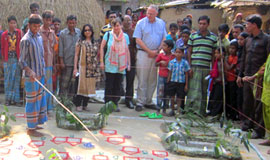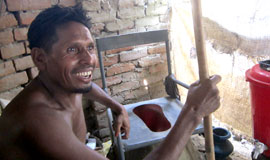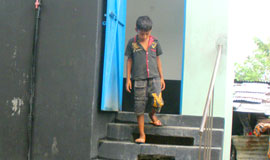Water and Sanitation (WatSan)

Safe water and adequate sanitation is essential for a healthy life. Environmental health is indispensable for livelihood changes. Health, environment and sanitation are interlinked with each other. Environment has articulate impact on health and livelihood change. Response to environment/climate change at the moment has become inevitable. Environment and climatic change has also obvious effect on water, sanitation and hygiene. The ultimate adverse effect causes increased health hazards and poverty in both rural areas in general and particularly in urban slums.
In this consequence, VERC has given high importance to the above mentioned sectors and brought it into a broad cluster to provide equal efforts with its available limited resources. Addressing the disaster issues in a segmented way will not help attain meaningful and sustainable impact in accordance with mission and strategies of the organization. Hence the initiatives / interventions being taken to empower the grassroots level people by mobilizing them through institution building and transferring capacity in them so that they can take actions locally to address the service needs. Also they can claim their due shares from the public service delivery agencies. Efforts in addressing health service needs, coping with environmental hazards like - disaster and improving sanitation needs widely being undertaken through the adoption of participatory methods and techniques.
Ongoing projects under WatSan:
- South Asian WaSH Result Program-II,Ragarhat, Kurigram
- South Asian WaSH Result Program-II, Ullahpara, Sirajgonj
- South Asian WaSH Result Program-II, Lalmohan & Charfassion, Bhola
- Community led Sustainable stunting free Villages Project,Chhatak, Shylet
- Improved WASH Services for the Rohingya Refugees and host Communities, Ukhiya, Cox's bazar
- Emergency Response Through Energy Project,Ukhiya, Cox's bazar
- Community Led Sustainable Improved Cook-stove Program of Savar, Keraniganj, Kaliakoir, Bagmara, Mohonpur & Durgapur Upazila
- South Asian WaSH Result Program-II,Ragarhat, Kurigram
- South Asian WaSH Result Program-II, Ullahpara, Sirajgonj
- South Asian WaSH Result Program-II, Lalmohan & Charfassion, Bhola
- Community led Sustainable stunting free Villages Project,Chhatak, Shylet
- Improved WASH Services for the Rohingya Refugees and host Communities, Ukhiya, Cox's bazar
- Emergency Response Through Energy Project,Ukhiya, Cox's bazar
- Community Led Sustainable Improved Cook-stove Program of Savar, Keraniganj, Kaliakoir, Bagmara, Mohonpur & Durgapur Upazila
Recently completed projects:
- Advancing Sustainable Environmental Health (ASEH)
- Community Initiated Sustainable 100% WatSan and Hygiene Behaviour Change, Kalma
- Advancing Sustainable Environmental Health (ASEH)
- Community Initiated Sustainable 100% WatSan and Hygiene Behaviour Change, Kalma




